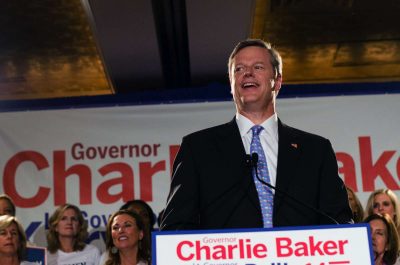
Massachusetts Gov. Charlie Baker and Lt. Gov. Karyn Polito announced six new programs that intend to make sustainable energy and energy efficiency more accessible for low and moderate-income Massachusetts residents, according to a press release issued by Baker’s press office.
The Baker-Polito administration also released the Affordable Access to Clean and Efficient Energy Final Report, which recommends expediting the provision of clean energy resources to all Massachusetts residents, according to the press release.
Kevin O’Shea, the spokesperson for the Massachusetts Department of Energy Resources, wrote in an email that the DOER’s role in the initiative is to assist in the implementation of the six new programs.
“The Baker-Polito Administration is committed to ensuring that all residents are able to take full advantage by breaking down traditional barriers to greater clean energy adoption to low/moderate income residents,” O’Shea wrote.
The DOER will also continue to work with the Department of Housing and Community Development to identify state-sponsored public housing for renewable energy improvements that can provide significant energy savings for the Commonwealth’s housing authorities, O’Shea wrote.
Betsy Harper, a sustainability program developer for the DHCD, wrote in an email that aligning low-income housing and clean energy is critical.
“Being able to bring these benefits of a) lowering carbon and b) significantly reducing energy bills to low income residents is ground-breaking,” Harper wrote. “It is a perfect application of state policy and state funding to overcome these barriers and make renewable energy available to the populations that truly most need it.”
The Affordable Clean Residential Energy program is another one of the six programs created as part of the new energy initiative and will fund nonprofits that serve low-income residents, and focuses on energy efficiency, according to the release.
New Ecology, a nonprofit that works to bring the benefits of sustainable development to the community level, will receive grant money through the program.
Edward Connelly, president of New Ecology, said the organization will use the grant money to develop a way to monitor the boilers within multi-family affordable buildings to try to get them to operate more efficiently.
“[ACRE] is a perfect alignment with what we do, because that’s basically our mission: to bring the benefits of sustainable development to communities that wouldn’t otherwise immediately get it,” Connelly said.
Connelly said one of the most important functions of the initiative is to facilitate communication among the parties involved.
“One of the challenges of this work is that a lot of times it’s not well-coordinated between the regulators, the financiers, the owners, [or] the tenants and this helps to coordinate it.” Connelly said. “I think it’s a big step in the right direction.”
Connelly said of the 12 different states the organization operates in, the Massachusetts program is the best.
“Between having combinations of incentives for efficiency, very deep rebates from the utilities, incentives for renewable and for solar, that combination of things puts us near the top,” Connelly said.
Several residents said they were optimistic about the outcome of the programs.
Michelle Atchinson, 60, of Back Bay, said she supports the administration’s clean energy program because it takes a stand against pollution and climate change.
“It sounds good to me,” Atchinson said. “Having clean energy is so important in this day and age when you hear all about climate change … anything we can do to make things more efficient. Less pollution on the planet is a good thing.”
Patrick Varner, 25, of Allston, praised the program, but said he thinks the government could be doing more to protect the environment.
“I think clean energy is always a good thing,” Varner said. “Environmental issues are a huge concern for everybody now and it seems to be something that ultimately leads to an economic stimulus as well in the end, so I’m totally for it.”
Varner said although Massachusetts is recognized for its clean energy programs, the nation as a whole is not known for similar successes.
“Massachusetts is probably pretty high on the list, as far as places who are doing alright with [clean energy] compared to other places,” Varner added. “I think as far as federal government goes, they can definitely do a lot more.”
Laurel Snow, 23, of the North End, said she likes the new program for its initiative and outlook toward the future.
“It sounds great … the concept is fantastic,” Snow said. “Clean energy should be the future — hopefully will be the future.”














